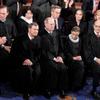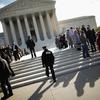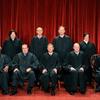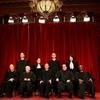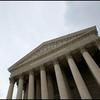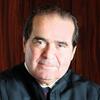Jeffrey Rosen appears in the following:
Awaiting the Supreme Court
Monday, June 18, 2012
Jeffrey Rosen is a professor of law at The George Washington University, legal affairs editor of The New Republic, and author of The Supreme Court: The Personalities and Rivalries that Defined America. As the Supreme Court's session nears completion, Rosen looks at the decisions to be decided, including the Affordable Care Act and the Arizona immigration case.
Supreme Court Considers Arizona's Immigration Law Today
Wednesday, April 25, 2012
Political Ads on Public Broadcasting?
Friday, April 13, 2012
Obama vs. the Supreme Court: US Attorney General Issues Memo
Friday, April 06, 2012
Yesterday Attorney General Eric Holder issued a memo, assuring the Supreme Court that President Obama respects the authority of the court to overturn federal laws they find unconstitutional. This memo came after Republican challengers to the Affordable Care Act accused the President of pressuring the Court during deliberations. We discuss the controversy with Jeffrey Rosen, Professor of Law at George Washington University, and Todd Zwillich, Takeaway Washington correspondent.
Day Three: The Supreme Court and Health Care
Wednesday, March 28, 2012
Questions and Answers on the Affordable Care Act
Wednesday, March 28, 2012
Day Two: The Supreme Court and Health Care
Tuesday, March 27, 2012
Supreme Court Hears Challenge to Health Care Law Today
Monday, March 26, 2012
Supreme Court to Rule on Corporate Crime and Personhood
Tuesday, February 28, 2012
Using the 14th amendment as their basis, many courts have treated corporations as people. Usually these rulings are beneficial to corporations and their larger interests, such as in the Supreme Court decision that allows corporations to endorse candidates like individuals. However, a new case will determine whether or not a corporation can be convicted as an accomplice to a crime against humanity. In Kiobel v. Royal Dutch Petroleum, Royal Dutch Petroleum and its subsidiary, Shell, are accused of aiding an autocratic regime that brutalized minorities in an oil-rich region of Nigeria.
Military Tries to Crack Down on Frauds
Monday, February 20, 2012
People go to great lengths to fabricate military service. For every real Navy SEAL the FBI estimates there are hundreds of impostors. Xavier Alvarez, for example is an impostor. Alvarez, once a member of a California water-district board, lied at a public meeting about being a war hero specifically that he was awarded the Medal of Honor. But his lies did more than make him an outcast. They made him a criminal.
Supreme Court Rules Against GPS Tracking
Tuesday, January 24, 2012
On Monday the Supreme Court ruled unanimously that police violated the 4th amendment when they placed a Global Positioning System (GPS) tracking device on a suspect’s car and monitored its movements for 28 days. In his opinion on the case, Justice Anthony Scalia wrote that the use of GPS constituted a "search" and therefore requires a warrant. This ruling may have an impact on other cases where GPS was used, as well as other types of surveillance mechanisms.
Supreme Court Rules in Favor of 'Ministerial Exception'
Friday, January 13, 2012
In a unanimous decision on Wednesday, the Supreme Court ruled that churches and religious organizations are exempt from employee discrimination laws when hiring or firing their own employees and leaders. Many are heralding this decision as key in reinforcing the separation between church and state, while others worry that this will allow these organizations far too much power. The initial complaint that motivated Hosanna-Tabor Church v. Equal Employment Opportunity Commission stemmed from a teacher at an elementary school who felt she was being fired for pursuing a disability claim.
Supreme Court Will Rule on Arizona Immigration Law
Tuesday, December 13, 2011
The Supreme Court has announced that it will rule on Arizona’s tough immigration law. The case is making its way to the highest court after the Ninth Circuit Court of Appeals in San Francisco blocked parts of the law in April. One of the parts of the law in question is a provision that requires state law enforcement officials to check the immigration status of anyone they stop or arrest.
Supreme Court Enters Term's Final Week
Monday, June 27, 2011
Today the Supreme Court begins the last week of its term, and it may have saved some of its most controversial decisions for last. The court will announce decisions on four remaining cases, two of which involve First Amendment disputes.
SCOTUS Decisions
Thursday, June 23, 2011
Jami Floyd, legal analyst, sometime guest host for The Brian Lehrer Show, and IAFC blogger, and Jeffrey Rosen, professor of law at The George Washington University and the legal affairs editor of The New Republic, discuss the decisions that came down from the Supreme Court today.
→ Add Your Comments, Listen, and Read a Recap at It's A Free Country
SCOTUS Rules On Greenhouse Gas Emissions
Tuesday, June 21, 2011
The Supreme Court unanimously agreed yesterday to reject a lawsuit brought on by six states, New York City, and several land trusts, seeking to reduce carbon dioxide emissions from major power plants. Justice Ruth Bader Ginsburg said that under the Clean Air Act, the case must be addressed by the Environmental Protection Agency, rather than by the courts. The Supreme Court maintains their 2007 ruling that only the EPA can dictate regulations on greenhouse gas emissions, but meanwhile Congress is trying to strip the EPA of its very ability to regulate these emissions.
Supreme Court Hears Wal-Mart Case
Tuesday, March 29, 2011
For the past 11 years, 1.5 million women have been taking on the world’s largest corporation, Wal-Mart, for what they claim is a corporate practice of gender discrimination. The case would be the largest employment discrimination suit in U.S. history, damages could be in the billions, and the whole process has already dragged on over a decade. But whether that suit will ever be heard in court still has to be decided. Today the United States Supreme Court will hear argument in Wal-Mart vs. Dukes. Their task is to decide whether such a large and diverse group of people — working for shops across the country — can even be considered a “class” and therefore capable of raising a claim.
Group Questions Justice Scalia's Impartiality on Campaign Finance Cases
Friday, January 21, 2011
A year ago, the Supreme Court decided on one of the most controversial campaign finance cases in recent history: Citizens United. The Court ruled 5-4 in favor of lifting a ban on corporate spending on political campaigns. Justice Scalia and Justice Thomas were two of the judges who concurred with the opinion of the court. Now, a liberal group, Common Cause, has filed a petition arguing that Scalia and Thomas should be taken off campaign finance cases.
'Reputation Bankruptcy,' and Other Ideas to Protect Yourself in a Digital World
Friday, July 23, 2010
You've got something you want taken offline: a drunken Facebook photo, an ill-advised blog post about your flirtation with Satanism, a frustrated tweet you wish you could take back. As Facebook passes its 500 millionth user, we take a look at new proposals to reduce the threat that we users of the internet pose to ourselves.
Aiding Suicide... With Words?
Tuesday, May 25, 2010
A former nurse appears in court in Minnesota this morning charged with two counts of aiding suicide. His weapon? Words. For years, William Melchert-Dinkel, 47, allegedly spent hours in online chat rooms with suicide themes, posing as a young female nurse and befriending vulnerable people contemplating suicide. He encouraged them to end their own lives, gave them tips on how to do it, and entered into suicide pacts with some - pacts police say he never intended to keep. At least two of the people he advised took their own lives – a 32-year-old British man in 2005, and an 18-year-old college student in Canada in 2008. Now Melchert-Dinkel is being charged with their deaths.
